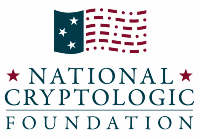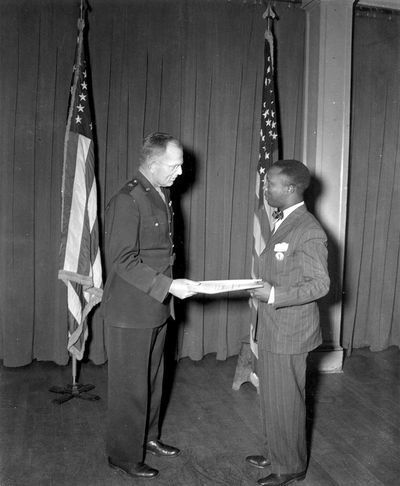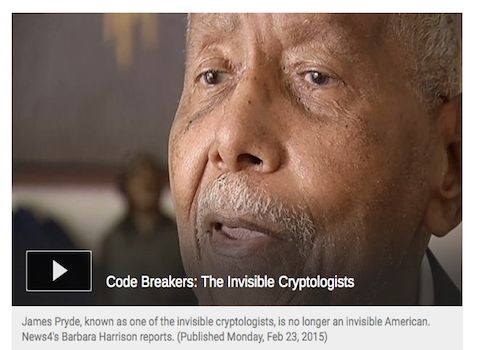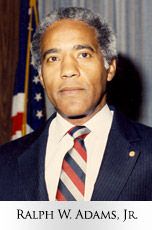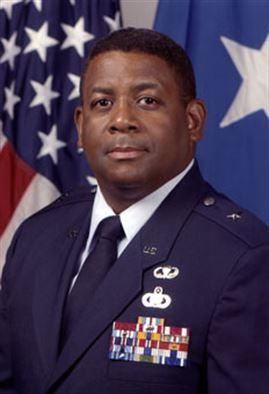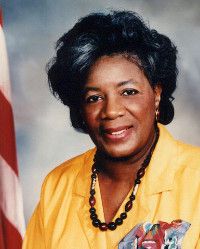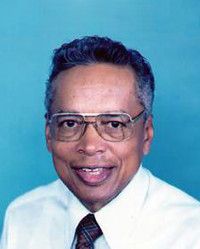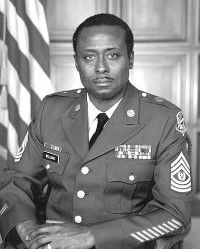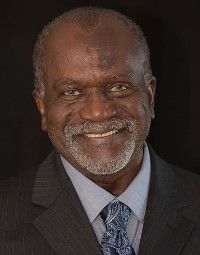Recognizing African American individuals who excelled in their fields, broke down barriers, and created opportunities for generations to come is an important tool for inspiring young African American minds to consider science and technology careers.
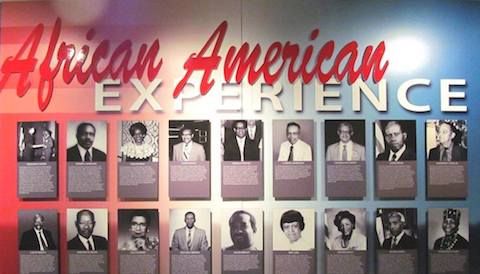
The African American Experience exhibit at the National Cryptologic Museum features several of the great African American cryptologists who have stood out in the history of code making and code breaking. Some of the earliest black persons hired by the fledgling Signal Intelligence Service were brought into the field as messengers, carrying notes from one analyst to another located in different or distant buildings.
In early 1944, General Cooke, then chief of cryptanalysis, was instructed to hire approximately 100 black individuals and give them meaningful work. With the help of his messenger, William D. Coffee, he established the first segregated unit of black cryptologists. The office became responsible for exploiting commercial coded messages. An all-white office had previously conducted this effort, but it had been disbanded. The new all-black office was responsible for identifying codes, decoding, translating, and routing commercial coded messages from a wide variety of countries. Although nominally under a white supervisor, Bill Coffee ran the daily operations of the office.
Learn more about the African American experience and about the individual honorees via the NSA.gov website. Several of the honorees are also featured below.
During Black History Month and all year round, we recognize individuals who excelled in their fields, broke down barriers, and created opportunities for the generations who followed. We are honored to highlight some of these individuals here on this page. It seems fitting to begin with the man noted above, Mr. William D. Coffee.
William D. Coffee
-
It is challenging to sum up the accomplishments of this true pioneer who broke barriers of racial discrimination. He recruited African-American cryptologists to work at Arlington Hall and quickly began to assume greater levels of responsibility and cryptologic duties.
Mr. Coffee led his cryptologic unit with distinction during World War II. His strength of character brought dignity to African-Americans in cryptologic work at a time when discrimination was sanctioned. His efforts made possible the advances toward acceptance of minorities and diversity values in the generation that followed. In April 1946, William D. Coffee was awarded the Commendation for Meritorious Civilian service for his wartime leadership in exploiting critical enciphered messages. Please click on his name to read his full NSA Cryptologic Hall of Honor summary.
James Pryde - One of "The Invisible Cryptologists"
In celebration of Black History Month 2015, NBC Washington produced a three-part series "Codebreakers: The Invisible Cryptologists" and followed the life of Mr. James Pryde, a radio operator with WWII's Tuskegee Airmen who became one of the "invisible cryptologists." View the articles & video.
Mr. Pryde joined the Armed Forces Security Agency in 1950 as a communications clerk. When it was discovered he could read automatic Morse tape, he was transferred to a signals analysis section, where he became a telemetry analyst.
Mr. Pryde then spent two years on detail to the staff of the Assistant Secretary of Defense. He served as the Director of the Defense Special Missile and Astronautics (now Aerospace) Center (DEFSMAC) from 1978 to 1980. While at DEFSMAC, he became a member of the Intelligence Community's Guided Missile Astronautic Intelligence Committee. In 1980, Mr. Pryde served as the NSA representative to the Department of Defense and in 1981 served as Assistant Deputy Director of Administration at NSA. He was inducted into the NSA/CSS Cryptologic Hall of Honor in 2006.
During his tenure, Mr. Pryde served as an advocate for NSA African-Americans. Through his efforts he helped promote a diverse workforce within NSA, and continued to remind the current generation of the struggles waged by their predecessors for equality. Mr. Pryde retired from NSA in 1981, but continued to support the National Cryptologic Museum and served on the board of the National Cryptologic Museum Foundation. Sadly, he passed away in 2017. He was buried with honors in 2018. View his In Memoriam page.
*You may also be interested in reading the NSA publication The Invisible Cryptologists - African Americans WWII to 1956 by Jeannette Williams and Yolande Dickerson. Visit the Cryptologic Heritage - Publications section of the NSA website and use the online contact form to request this publication.
Ralph W. Adams, Jr.
Mr. Ralph W. Adams, Jr. was a superb Vietnamese language analyst and an extraordinary manager and mentor of linguists. He rose to NSA's second highest civilian position as Executive Director. He was a champion of diversity at NSA who recognized the importance of equality in the workforce. Mr. Adams was one of the original program managers for the Stokes Educational Scholarships, designed to facilitate the recruitment of individuals, particularly minority high school students.
When he retired in 1996, Mr. Adams was presented the National Intelligence Distinguished Service medal, the highest Intelligence Community award for distinguished and meritorious service. He was inducted into the NSA/CSS Cryptologic Hall of Honor in 2015 (click on his photo to go to his full NSA Hall of Honor page). Though he passed away in 2017, Mr. Adams and his contributions will always be remembered.
Brigadier General Neal T. Robinson, USAF (Ret)
Brig Gen Neal T. Robinson was an academic and civic leader in his youth, which led to an appointment to the USAF Academy in 1970. Following graduation, he became an intelligence officer serving in the toughest assignments in hot spots around the world: South Korea, Iran (where he was taken hostage during the 1979 crisis), Panama, Italy, and Germany. He did multiple tours in the Pentagon, Texas, and Maryland.
Neal was head of intelligence for European Command during the Kosovo War. He approached every job with total dedication and always produced effective results. After retirement in 2005, he continued his service to country in industry, most recently with Oracle Corporation, which he saw as the best opportunity to help protect our nation.
Sadly, we lost our friend Neal in May 2017 after he contracted an aggressive infection resulting from chemotherapy treatment for cancer that had spread to his bones. Please click on Neal's photo to learn more about his military career and to read his full obituary in our In Memoriam Registry.
Minnie McNeal Kenny
Minnie McNeal Kenny served as a civilian for 43 years. She joined NSA as a communications clerk at the GS-4 level, higher than the starting grades offered to African Americans at the time. She was an expert in the fields of language, cryptanalysis, and traffic analysis. Throughout her tenure, she worked to further the cause of minorities at NSA. Her legacy was not only in the impressive changes she effected in NSA structure, policy, and practice, but in the inspiration she was to all NSA employees, regardless of race, giving them faith that they could effect beneficial changes, even in a large institution.
During the course of her 43-year career, Ms. Kenny received NSA's two highest awards: the Meritorious Civilian Service Award (1980) and the Exceptional Civilian Service Award (1984). Her recognitions went beyond NSA. Presidents Ronald Reagan and George Bush Sr. singled her out for the Meritorious Executive Award. DCI also gave her the Intelligence Community's Distinguished Service Award. Mrs. Kenny filled several high level positions in her career including the Deputy Chief of an analytic support division, a Division Chief in the Office of Techniques and Standards, the Deputy Assistant Director for Training with direct responsibility for day-to-day operations of the National Cryptologic School, and the Assistant Director for Administration. She also represented the DoD on the Congressional Task Force on Women, Minorities, and the Handicapped in Science and Technology.
Ms. Kenny was inducted into the NSA Cryptologic Hall of Honor in 2009. To read her full Hall of Honor entry, click on her photo.
Carroll Robinson
Mr. Carroll Robinson was NSA's first black engineer. He was hired by NSA's Research and Development organization to assist in building the Agency's first in-house developed computer, ABNER 1. At the time, R&D was one of the few areas of the Agency where African Americans and their white coworkers worked side by side to further the NSA mission. Mr. Robinson was the Agency's first African American Senior Executive.
Command Sergeant Major Odell Williams, USA
Command Sergeant Major (CSM) Odell Williams was a superb Non-Commissioned Officer (NCO) whose impact extended far beyond those he supervised. CSM Williams was an exceptionally talented educator and manager. He reduced the review cycle time for military cryptologic training by two years, and the time to implement curriculum changes by sixty days. He coordinated the development of courses in Operational Electronic Intelligence (ELINT) and Fusion Intelligence, instituting "first of its kind" virtual/online training at the Naval Technical Training Center. His initiatives helped gain significant additional Congressional funding to support ELINT training. He also brought innovative capabilities to computer networks and network exploitation training for military cryptologists.
CSM Odell Williams' ability to get things done and to find solutions to challenging problems were what made him a superb NCO. He was inducted into the NSA/CSS Cryptologic Hall of Honor in 2016. Click on his photo to visit his Hall of Honor page.
Floyd L. Weakley
Mr. Floyd Weakley was a National Security Agency (NSA) trailblazer in cryptanalysis. He led an elite cryptanalytic team, and he developed a brilliant cryptanalytic test procedure that bears his name. He also played a key role in NSA's recruitment of minorities into cryptologic careers. He was inducted into the NSA/CSS Cryptologic Hall of Honor in 2017. Learn more below and via his Hall of Honor page.
Floyd reported to NSA in 1965 as a mathematician in a development program for new cryptanalysts. By the 1980s, he was leading a team of analysts in the study of a state-of-the-art cryptosystem used by several major adversaries of the United States. His understanding of the technology involved was a major factor in the team's success. Mr. Weakley authored or co-authored twenty-three technical papers. He also was instrumental in establishing a career development program for cryptanalysts.
Mr. Weakley had a profound effect on NSA's hiring of minorities and their career development. As a member of many boards and in his role as a technical director, he fostered new approaches to diversity issues. In recognition of these efforts, the NAACP presented Floyd Weakley with the Roy Wilkins Renowned Service Award at their national convention in 1996. He was inducted into the NSA/CSS Cryptologic Hall of Honor in 2017. Click here or on his photo to visit his Hall of Honor page.
Charles Matthews
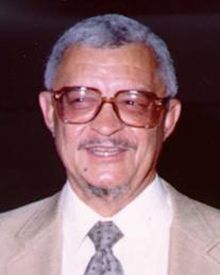
Charles Matthews, a lifelong Washington resident, became the first student at Hilltop Radio-Electronics Institute, a black-owned electronics school open to African-Americans in Washington, D. C. After graduating, he was hired in 1948 by the Army's cryptologic service at Arlington Hall. As an engineering technician, he worked in the Research and Development organization. Even though his white counterparts, with equal or less experience, received better pay, his $2,100 salary was better than most African-Americans were earning in other positions in the National Security Agency.
Initially, Mr. Matthews tore down equipment, but later he became a project engineer on ABNER 1, the first in-house designed digital computer. He was one of a few African-Americans on the project. He also worked on SOLO, the Agency's first transistorized special-purpose computer. He went on to hold a succession of supervisory and middle-management positions and received the Meritorious Civilian Service Award in 1986. Mr. Matthews retired in 1988.
Calvin Brown
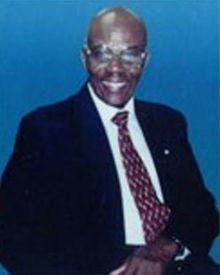
Calvin Brown started in the National Security Agency in 1951 as a tabulating machine operator, but since he had completed drafting school, he soon transferred to a facilities management position. After Fort Meade was identified as the new Agency location, two people Mr. Brown and his supervisor, developed the floor plan and move schedule for all the printers, sorters, collators, and card punch machines used by the machine processing unit. Mr. Brown managed the transportation of equipment, its proper placement in the new building, and later assisted in the design of the first raised flooring for computers. Mr. Brown retired in 1982.
Lillie Berry
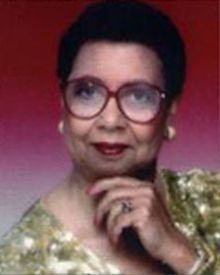
Ms. Lillie Berry began her career at Arlington Hall in 1956 as a clerk typist in the signals analysis unit. She quickly learned the terminology and pressed analysts to explain to her the concepts. After attending a signals analysis course and mastering a basic understanding of the subject, she was requested, in the early 1960s, to teach portions of the introductory material. She, thus, became the first African American woman in the Agency to give instruction in that discipline. In 1968, she marked another first when she became the first African American woman assigned as an Agency recruiter. Finally, Ms. Berry is remembered for having established the Career Information Center, the predecessor of today's Career Resource Center. Ms. Berry retired in 1988.
Wilhelmena Ware
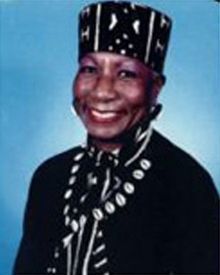
Ms. Wilhelmena Ware began her career at the Agency in 1949 as a cardpunch operator. In 1952, she was promoted to a supervisory position and in that capacity taught a comprehensive keypunch course to the Agency's first hearing impaired employees. Later, Ms. Ware became a computer science instructor in the National Cryptologic School and taught Introduction to Computer Systems Operations. Ms. Ware was promoted to Chief of the Learning Center where she was instrumental in instituting a number of programs, including the implementation of the sign language course. In 1980, Ms. Ware spearheaded the development of the Agency's instructional television program in partnership with the University of Maryland and George Washington University. Ms. Ware retired in 1993.
Bernard W. Pryor
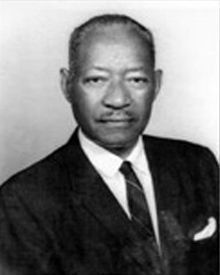
Bernard W. Pryor is believed to be the first African-American hired by the Army's Signal Intelligence Service. He had been a motorcycle messenger with the Navy Department when he began his career in 1939 as a messenger with Signal Intelligence Service. By mid-1943, Mr. Pryor was the senior messenger of 15 people. In 1944, he moved to the personnel department most likely to assist the Blacks that were being hired in increasing numbers. He remained in personnel until he retired in 1965.
Debora A. Plunkett
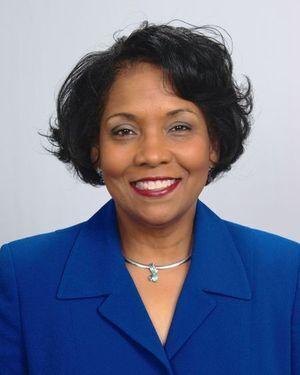
Debora Plunkett is a leader with more than 30 years of experience leading large, complex organizations. Culminating a career of U.S. federal service in 2016, she currently is Principal of Plunkett Associates LLC, a consulting business. She is a Senior Fellow at Harvard’s Belfer Center for Science and Technology and an Adjunct Professor of Cybersecurity in the University of Maryland’s Graduate School. She serves on the corporate boards of JCPenney, CACI International, and Nationwide Insurance. She is also a founding member and Chairman of the Board of Defending Digital Campaigns, a non-profit entity focused on providing free or low-cost cybersecurity services to federal election campaigns.
As a federal senior executive, Ms. Plunkett served first as the Deputy Director and thereafter for over four years as the Director of the National Security Agency’s Information Assurance Directorate. As the leader of NSA’s cyber defense, cryptography and information systems security missions, she directed thousands of personnel across NSA’s worldwide presence and managed a multi-million-dollar budget. Her efforts enabled continuous innovation and development of strong security solutions and policies for the protection of the classified communications of the United States government, serving the needs of a wide range of consumers from the White House to the war fighter. Ms. Plunkett also served as the first Senior Advisor to the Director of the National Security Agency (NSA) for Equality where she led efforts to develop and deliver solutions to improve equality, inclusion and diversity for the highly technical NSA workforce. Her efforts resulted in the identification and implementation of new strategies to address systemic issues. Click to read her full bio.
Debora has participated in two NCF #CyberChats. Click to learn more about either her chat with us on March 2021 or November 2020.
